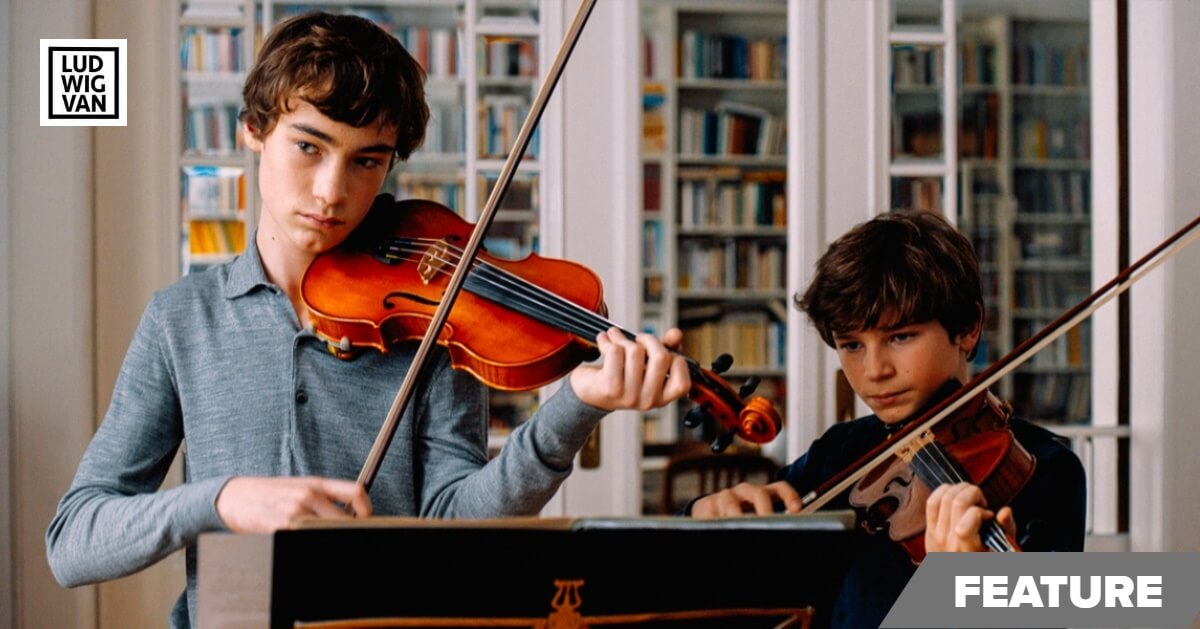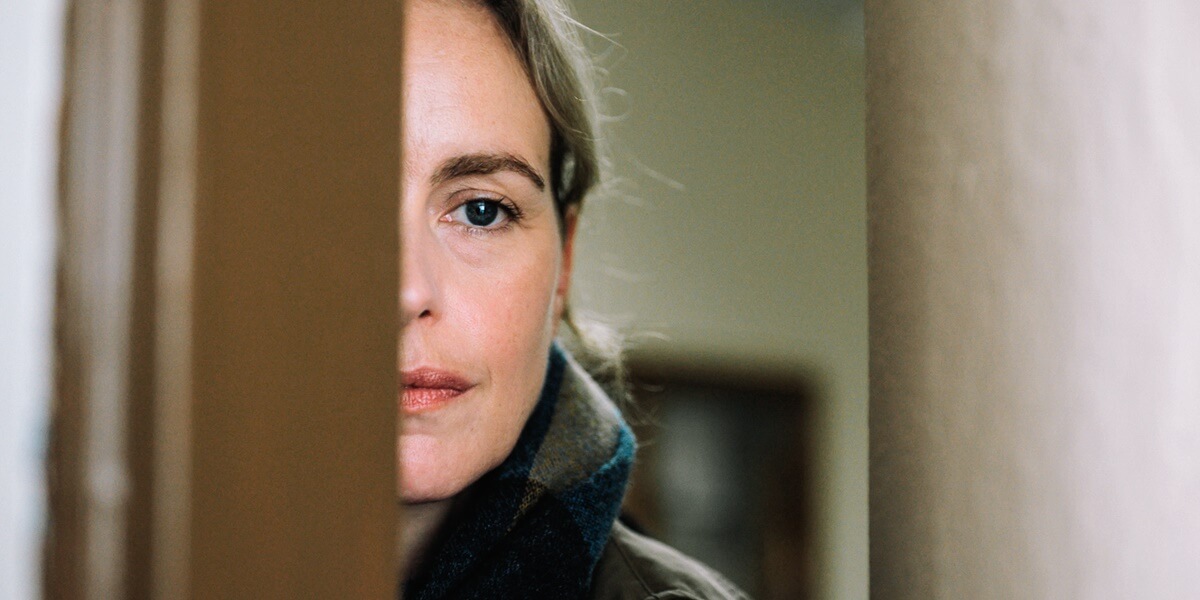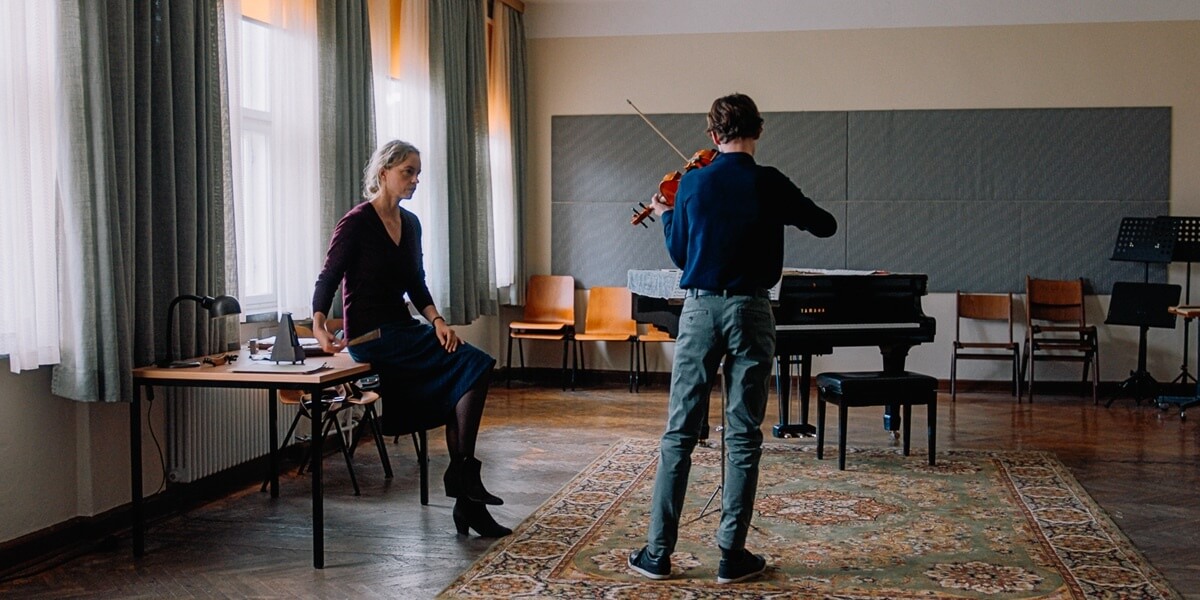Ina Weisse’s film ‘The Audition’ takes audiences into a world where the discipline of classical music training takes a dark turn.

It’s true that the world of classical music is demanding, and sometimes even unforgiving. It’s the perfect milieu for stories about complex, layered characters and intense desires filtered through exacting discipline – the world of German director Ina Weisse’s new film, ‘The Audition’.
‘The Audition (Das Vorspiel)’ got its world premiere at the Toronto International Film Festival in September 2019, with Ina Weisse and star Nina Hoss in town to walk the red carpet. ‘The Audition’ is Weisse’s second feature, after 2008’s ‘Der Architekt ‘ which premiered at the Berlinale. Weisse is also known as an award winning actress in her native Germany.
Anna Bronsky is a violin teacher at a prestigious music school in Berlin, a woman who has compartmentalized her life to the point where she seems to be leading several separate lives. “She is the woman who fights with herself,” Weisse notes. “Layer upon layer, it grows.” She is the seemingly loving mother to son Jonas (Serafin Mishiev), a violin student who is less than dedicated, to her chagrin, and wife to husband Philippe Bronsky, a French violin and string instrument maker. These are lives that revolve around classical music.

As we meet her, Anna defends the selection of a young pupil to study in preparation for the entrance exam to the school, against the opinions of her fellow teachers. Anna believes she can see the great potential in Alexander (Ilja Monti) and turns her rather severe notions of music practice and discipline on him. Her involvement with Alexander’s studies becomes more and more intense, driving a wedge between Anna and her own family. An attractive cellist and his offers to return to playing and performing in his quintet offer her yet another direction that takes her away from husband and son. “It’s a big point [for a musician] when you can’t play,” Weisse says of her motivation.
According to Weisse, most of the cast does have classical music training, and the initial idea for the film came from a desire to convey that world. Weisse plays the violin herself, and co-writing partner Daphne Charizani plays the cello. Both, in fact, have played in orchestras. Hoss plays the piano; the regimented realm of music study and practice is familiar to all of them. Weisse found Ilja Monti while scouting high school music programs. The familiarity lends authenticity to the story — it rings true.
The string quartet Anna practices with in the film is a real one — Berlin’s Kuss Quartett. “They are famous in Germany,” Weisse says.
“The rehearsal was really improvised,” adds Hoss. She says that it made the dialogue for that scene entirely realistic.
Anyone who has studied classical music will relate to Anna’s devotion to perfection and unyielding standards, whether it’s from a student’s or teacher’s point of view. As Weisse points out, that level of devotion to your art really is required in order to become a great classical musician. In ‘The Audition’, though, Anna’s tunnel vision becomes part of a mid-life crisis that veers into obsession.

The camera often lingers on Anna’s face, and Hoss ably conveys a range of emotions from corrosive dissatisfaction to fleeting happiness. Anna is the story. “The structure of the film came from the character,” Weisse says.
Nina Hoss perfectly embodies Anna in all her inner, and largely unspoken, tension. It rarely bubbles to the surface, but can be felt in her movements and expression. She’s riveting as the centre of the film. “The necessary things are between the lines,” Hoss says. “When I read the script, I knew that what will happen lies between the lines.”
In one aspect, as Weisse notes, the between-the-lines approach made it somewhat harder to get financing for the film, a Germany-France co-production. Potential backers often couldn’t grasp the multi-layered plot, with its nod to issues of immigration and class that also play out against the backdrop of a posh music school in Berlin.
Filming began with the scenes at the school, which meant that Hoss had to conceive of this character and all her inner demons and conflicts without the context of the rest of the story. “In the beginning, I thought, how do I tell this story in two weeks in the school? I was always torn with her.”
For Hoss, there is one scene that gets right to the heart of Anna’s character. Visually, it plays out simply as Anna puts on a recording of Yehudi Menuhin playing. It’s in her wordless reaction that we can see just how much the music consumes her. “This is her anchor point.”
The ending is subtle, yet shocking, and may leave audiences wondering exactly which direction it takes. “I like the surprise at the ending,” Hoss says.
“I don’t want to really explain the end,” Weisse says. “For everybody, it’s different.”
#LUDWIGVAN
Want more updates on classical music and opera news and reviews? Follow us on Facebook, Instagram or Twitter for all the latest.
- PREVIEW | SUMMER OPERA LYRIC THEATRE Presents Handel’s Xerxes, Mozart’s Idomeneo & Puccini’a La Boheme July 26 To August 4 - July 26, 2024
- PREVIEW | YENSA Festival V.2 Offers Black Flames Performances & Other Ways To Celebrate Black Women In Dance - July 25, 2024
- PREVIEW | Canadian Talent Conspicuous In The Met: Live In HD 2024-25 Season - July 25, 2024



